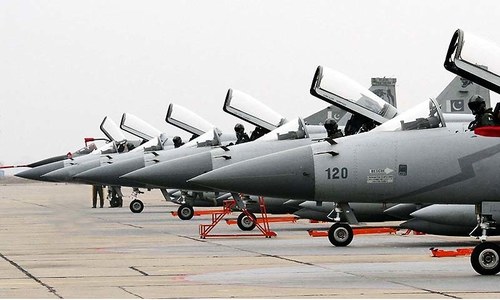ISLAMABAD: Defence expenditure in the next financial year will grow by a little less than 11 per cent to Rs860 billion from what is was in the outgoing year.
Last year the revised figure at the close of the financial year was Rs776 billion for the outgoing year ending on June 30.
“We have catered for the needs of the armed forces keeping in view the security challenges,” Finance Minister Ishaq Dar said in his budget speech.
The increase in defence spending contrasts with a 3.6pc increase in the government’s current expenditure and a 7.3pc growth in the total expenditures. The comparison with the national budget shows how much money is going to the armed forces in real terms.
The defence budget does not cover the cost of military pensions, which average at Rs127bn per year since 2010, and this year have been allocated Rs178bn. These are paid out of the civilian budget. It also does not cover the nuclear programme or the cost of the military operations under way in the Federally Administered Tribal Areas.
Military pensions, nuclear programme and Fata operations not included in defence budget
The defence budget has grown consistently over the past five years by around 11pc per annum except for 2013-14, the first year of the current government, when it spiked up by 15pc. It overtook the development budget in 2010 in its total size, and this year too it is larger than development budget by Rs60bn. The development budget also includes a Rs100bn allocation for security purposes.
The share of defence budget as percentage of GDP is also increasing although at a nominal pace. The proposed defence budget is 2.6pc of GDP. Meanwhile, it was 2.5pc and 2.3pc of GDP in the preceding two years (2015-16 and 2014-15 respectively). Calculating defence budget as percentage of GDP shows its burden on the national economy. In 2005-06 defence spending was over 4pc of the GDP, but declined afterwards. More recently an upward trend, albeit a marginal one, is noticeable.
Of the Rs860bn allocation, about Rs2bn would be spent on defence ministry establishment where the remaining Rs858bn would be distributed among the three services — Army, Air Force and Navy.
The three services would spend Rs211bn on local purchases and import of arms and ammunition; Rs216bn on operational expenses; Rs327bn on salaries of soldiers and officers; and Rs104bn on maintenance of its buildings and construction of new ones.
Comparing these with last year, it can be inferred that the increase would be the highest in acquisition of weapons, followed by operational expenses, which cover transport costs, ration, treatment and training. The increase has been minimum in employee-related expenditures.
Globally defence spending has increased this year for the first time since 2011. Asia, particularly the Middle East, has been the biggest driver behind the resumption of the upward course. The increase in global defence spending has, however, been restrained by decline in oil prices and economic hardships.
In Pakistan’s neighbourhood, its arch-rival India would this year be spending $36.5 bn, while ally China’s military budget is $215bn.
Published in Dawn, June 4th, 2016














































